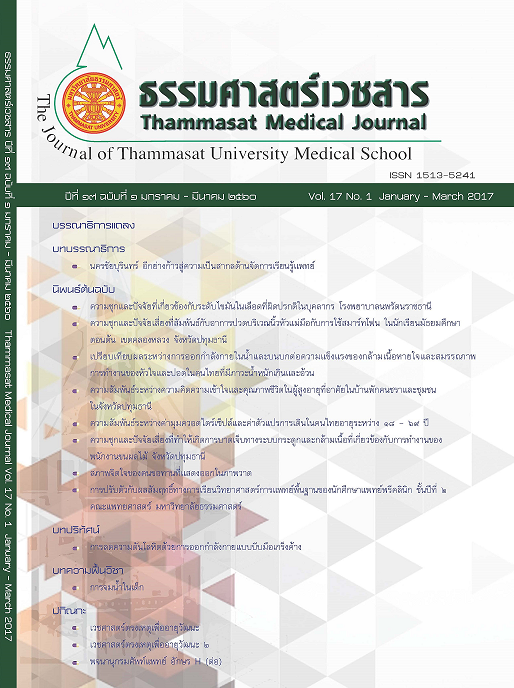Adaptation and basic medical science achievement of the second preclinical year medical students of faculty of Medicine, Thammasat university
Keywords:
Adaptation, Medical student, Learning achievement, การปรับตัว, นักศึกษาแพทย์, ผลสัมฤทธิ์ทางการเรียนAbstract
Introduction: The objectives of this research were to study: 1) associations between personal factors and basic medical science achievement of the second preclinical year medical students 2) the relationship between grade point averages in the first year and basic medical science achievement of the second preclinical year medical students 3) adaptation levels of the second year medical students in semester 1 and 4) the relationship between levels of student’s adaptation and basic medical science achievement of the second preclinical year medical students.
Method: The population included 172 second-year medical students of faculty of Medicine, Thammasat university. The instrument was questionnaire. The statistics used to analyze the data were frequency, percentage, mean, standard deviation, Chi-square test, Fisher’s exact test and Monte Carlo methods.
Result: The basic medical science achievement of the second preclinical year medical students was not associated with personal factors, however, it related to grade point averages in the first year and the levels of the second year medical student adaptation at the 0.05 level of statistical significance. Most of medical students had moderate adaptation in overall. Behaviors which impacted these relationships were punctuality, listening and note-taking to lectures carefully, sleeping during teaching, summarization, reviewing lessons when having free time and consideration about tables and chairs for reviewing lessons.
Discussion and Conclusion: Overall, most of medical students had moderate adaptation because subjects in the second year may be difficult and differ from subjects in the first year. The 14 students (8.1%) had minimal adaptation which had behavior impacting on their study and were risk groups requiring most support.
บทนำ: การวจิ ยั นีม้ วี ัตถปุ ระสงค์เพื่อศึกษา ๑) ความสัมพันธร์ ะหวา่ งปจั จัยพืน้ ฐานส่วนบุคคล กับผลสมั ฤทธิท์ างการเรยี นวิทยาศาสตร์การแพทย์พื้นฐานในชั้นปีที่ ๒ ๒) ความสัมพันธ์ระหว่างผลการเรียนเฉลี่ยในชั้นปีที่ ๑ กับผลสัมฤทธิ์ทางการเรียนวิทยาศาสตร์การแพทย์พื้นฐานในชั้นปีที่ ๒ ๓) ระดับการปรับตัวของนักศึกษาแพทย์ชั้นปีที่ ๒ ภาคการศึกษาที่ ๑ และ ๔) ความสัมพันธ์ระหว่างระดับการปรับตัวของนักศึกษาแพทย์ชั้นปีที่ ๒ กับผลสัมฤทธิ์ทางการเรียนวิทยาศาสตร์การแพทย์พื้นฐานในชั้นปีที่ ๒
วิธีการศึกษา: ประชากรในการศึกษา คือ นักศึกษาชั้นปีที่ ๒ คณะแพทยศาสตร์ มหาวิทยาลัยธรรมศาสตร์ จำนวน ๑๗๒ คน เครื่องมือที่ใช้ ได้แก่ แบบสอบถาม สถิติที่ใช้ในการวิจัย ได้แก่ ค่าร้อยละ ค่าเฉลี่ย ค่าเบี่ยงเบนมาตรฐานไคร์สแควร์ ฟิชเชอร์ และมอนติคาร์โล
ผลการศึกษา: ผลสัมฤทธิ์ทางการเรียนวิทยาศาสตร์การแพทย์พื้นฐานในชั้นปีที่ ๒ ไม่มีความสัมพันธ์กับ ปัจจัยพื้นฐานส่วนบุคคล แต่มีความสัมพันธ์กับ ผลการเรียนเฉลี่ยในชั้นปีที่ ๑ และ ระดับการปรับตัวของนักศึกษาแพทย์ชั้นปีที่ ๒ อย่างมีนัยสำคัญทางสถิติที่ระดับ ๐.๐๕ ในภาพรวมนักศึกษาแพทย์ปรับตัวอยู่ในระดับปานกลาง พฤติกรรมที่มีความสัมพันธ์กับผลสัมฤทธิ์ทางการเรียน ได้แก่ การเข้าเรียนตรงต่อเวลา การตั้งใจฟังและจดบันทึกการบรรยายการนอนหลับระหว่างอาจารย์สอน การสรุปสาระสำคัญ การทบทวนบทเรียนเป็นประจำเมื่อมีเวลาว่าง และการเห็นความสำคัญของโต๊ะและที่นั่งสำหรับอ่านทบทวนบทเรียน
วิจารณ์ และสรุปผลการศึกษา: ในภาพรวมนักศึกษาแพทย์ปรับตัวได้ปานกลาง เนื่องจากการเรียนในชั้นปีที่ ๒ นั้นยากและแตกต่างจากชั้นปีที่ ๑ มีนักศึกษาจำนวน ๑๔ คน คิดเป็นร้อยละ ๘.๑ ปรับตัวได้น้อยที่สุด ซึ่งส่วนใหญ่มีพฤติกรรมที่กระทบต่อการเรียน จึงเป็นกลุ่มเสี่ยงที่ต้องให้ความช่วยเหลือมากที่สุด


